Editorial Note: This post is part of how to study the Bible (the complete series).
Because it is the foundational text for the Christian faith, a survey of the New Testament helps to ground us in interpreting any part of it. One of the basic rules of Bible interpretation is that the meaning of a specific text cannot contradict the message of the greater parts (i.e., the specific book it’s in or the overall message of the whole of Scripture).
The New Testament is a wonderful collection of writings that provide us with rich history, and guidance for Christian living. But in it, you will not find a big list of rules for how to live, or how to decide what is right/wrong. As we’ll see through this study, Jesus didn’t come to give us more rules. He came to make a path for all of mankind to be able to come into relationship with God.
And, as we’re about to see, He simplified the rules for living a Godly life.
Catechism – The New Covenant (BCP p. 850)
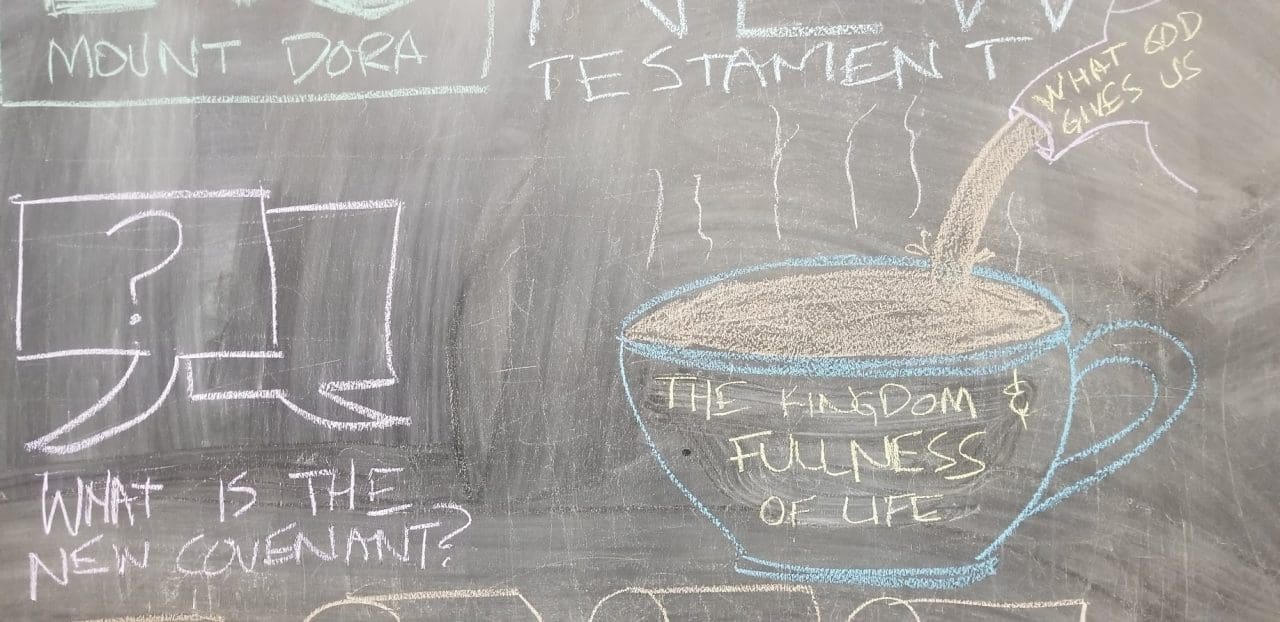
Q: What is the New Covenant?
A: The New Covenant is the new relationship with God given by Jesus Christ, the Messiah, to the apostles; and, through them, to all who believe in him.
My thoughts: When we think about the Old Covenant, we know that God pursues us. Even when we turn our backs on Him, He still wants a relationship with us. And so much of the Old Testament points to a coming time when that new hope will come. So while this is a NEW thing, it’s really just the next part of an ongoing story of God’s relentless pursuit of relationship with us.
Q: What did the Messiah promise in the New Covenant?
A: Christ promised to bring us into the kingdom of God and give us life in all its fullness.
My thoughts: This is an interesting word selection… “fullness.” Christ didn’t promise that everything would always be perfect and wonderful. He promised life in its fullness. In one of the definitions of that word, it relates to having eaten enough. It’s not overflowing with more that we can eat. And it’s not a guarantee that it would be the most delicious all the time. But it does indicate that there would be no lack. Life is full of experiences, emotions, and opportunities. And that’s what we’re promised… fullness of life.
Q: What response did Christ require?
A: Christ commanded us to believe in him and to keep his commandments.
My thoughts: This is where the faith thing comes in. A big part of this statement is to believe that He is Who He is supposed to be. This is often difficult for an analytical mind searching for hard evidence. The evidence exists, but do we want to believe it. We have that choice. And if we do, then following His voice is the next logical step.
Q: What are the commandments taught by Christ?
A: Christ taught us the Summary of the Law and gave us the New Commandment.
My thoughts: Through the Old Testament, we see LOTS of laws. Jesus simplified all of that for us. And in doing so, He got more to the heart of what He has always wanted from us.
Q: What is the Summary of the Law?
A: You shall love the Lord your God with all your heart, with all your soul, and with all your mind. This is the first and the great commandment. And the second is like it: You shall love your neighbor as yourself.
My thoughts: Simple. Love God, and love each other. (But it’s not always that simple. Is it?) That’s what need to strive for in all we do. If you believe in God, that’s often easy to do. Until we hit difficult times and think He’s not there. But that contradicts what we’ve learned about Him through the Old Testament. He’s always pursuing us. But he never promised that it would be an easy life (just a full one). Often the more difficult of these two might be the loving our neighbor part. The trick to doing that might be in this next question…
Q: What is the New Commandment?
A: The New Commandment is that we love one another as Christ loved us.
My thoughts: Christ didn’t come to be served, but to serve. He gave up His life for us. Over and over, we see that Jesus regularly sacrificed it all for the benefit of those around Him. Could He have come in power and wiped out all of the bad people and set up His throne for all to come worship Him? Certainly. But He didn’t. He came and showed us the Way. We need to get over ourselves and live a selfless life for the benefit of others.
Q: Where may we find what Christians believe about Christ?
A: What Christians believe about Christ is found in the Scriptures and summed up in the creeds.
My thoughts: And that’s why we’re doing this survey of the New Testament. Looking over the structure and over-arching story helps us to see the life of Jesus and His teachings so that we can experience that fullness of life in our Christian experience.
The Structure of the New Testament
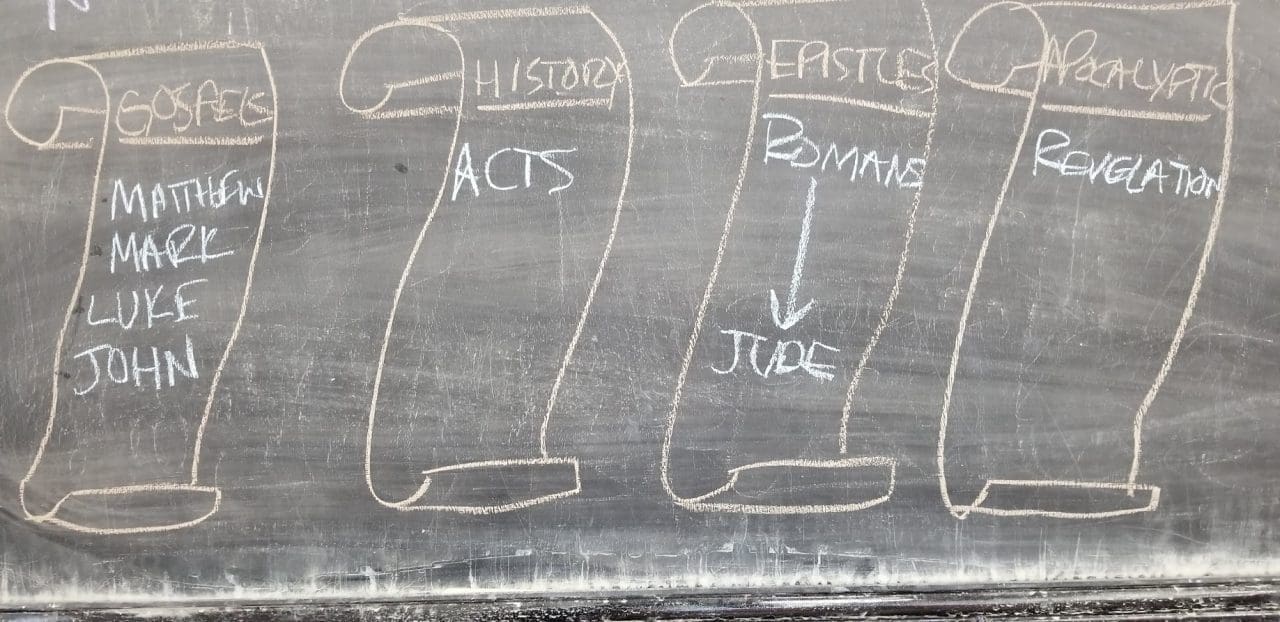
With the New Testament, there are a couple ways we could categorize the writings. At it’s core, we have historical writings that tell us the story of this New Covenant, and we have letters with guidance and instruction for how to live as Christians. But we’ll break them down further into four main categories:
- Gospels – The four Gospels (Matthew, Mark, Luke, and John) are all about the life and teachings of Jesus, told to different audiences and from different perspectives. The first three are referred to as the synoptic gospels. And then the Gospel of John contains different stories (and different focus). But all point to the Cross as being the central theme of the writings, as it is the central event that defines Christianity.
- History – Acts of the Apostles is the only other historical narrative (aside from the Gospels) in the New Testament. It picks up after the life of Jesus and tells us the story of the birth and early growth of the Christian Church.
- Epistles (Letters) – All of the other books in the New Testament are written either to individuals or to churches in various regions established by the Apostles. These are largely instructional in nature, and deal with various issues that the early church was dealing with as they grew.
- Apocalyptic – Technically, written as an epistle (letter) to the church, Revelation is a little different in nature. It’s from a genre of apocalyptic writing and it much more like the prophetic writings (as in the Old Testament).
Much like the Old Testament, the New Testament isn’t the end of the story. Several elements of the stories and letters point to future events, which we often refer to as the “end times.” But even that isn’t the “end” of everything. As Christians, building on the Old Testament, these are the writings most central to our faith and how we should live a Christian life.
A Simple Overview of the New Testament
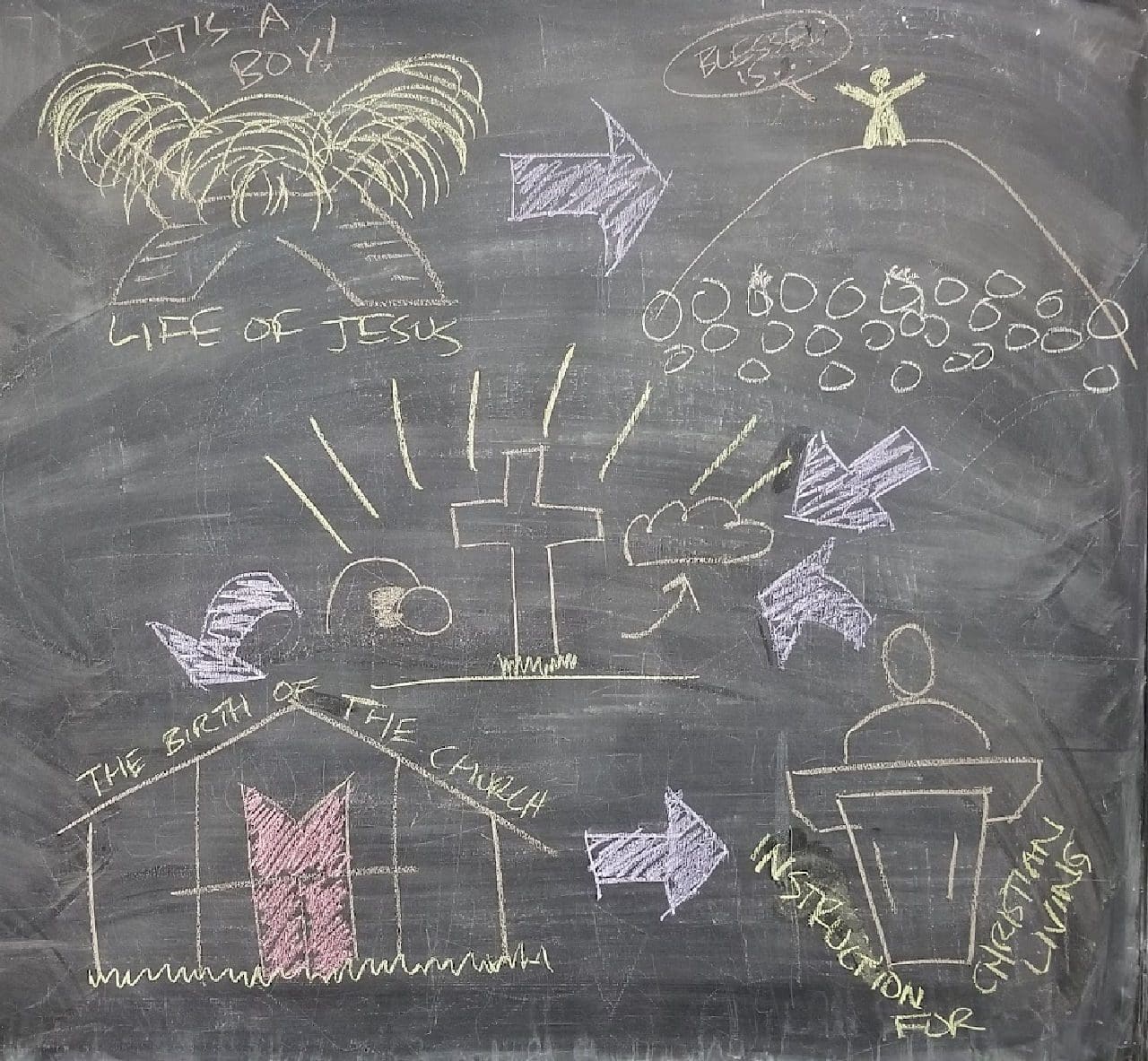
Looking over the New Testament from a high level we see this basic flow of the story unfolding with this New Covenant:
- Life of Christ – Even starting with the conception and birth, we see a glimpse into the life of Jesus. With many events being foretold in the Old Testament writings, the fulfillment of prophecy gives credibility to the old prophetic writings and to the claim that Jesus is who He is supposed to be. The biggest event recorded in His life is that of the crucifixion. Everything else points towards that.
- Teachings of Christ – The teachings of Jesus were often counter-cultural, and were the very thing that angered the religious leaders of the day so much. But everything Jesus taught us gets right back to the heart of God and what He really wants from us… a relationship. So while His life serves as an example for how we should live, His teachings give us insight into His heart.
- Birth of a Church – After the death, resurrection, and ascension of Jesus, we see His disciples go out and start growing the Church. They are instructed to wait on the Holy Spirit to come. Then empowered by the Spirit, they take the Message of salvation to the whole world.
- Instruction for Christian Living – Jesus didn’t come to give us a whole new list of rules we needed to follow. But we do have His instruction on the simplified Summary of the Law and the New Commandment (which is really the simple version of the previous Law provided in the Old Testament). Jesus became the sacrifice for our sins, so we no longer need to give them. But living this new Christian way of life certainly had obstacles. And the letters we have deal with many of these obstacles and provide us with guidance for how we should live in this fallen world.
- Future Hope – The events and writings of the New Testament are not the end of a story. Rather it’s the second phase of a great story that’s still ongoing. With the prophetic writings we have from John in Revelation, we see a vision of the future of when Christ returns and sets up the New Kingdom. And all who follow Him will experience this new eternal life with Him.
Many of the issues we deal with today are not new. This brief record we have of the life and teachings of Jesus, and the teaching and life application we get from the Apostles, helps us figure out how to live the kind of life in relationship with God that He always wanted. And as we look to interpret these writings for application in our own lives, it’s important for us to always be mindful of their place in the story.
What This Survey of the New Testament Means To Us
When I do a little survey of the New Testament myself, the first and main thing that stands out to me is that God continues in His relentless pursuit of a relationship with us. But He doesn’t force it on us either. His message is, “Come to me.” Then He makes the Way and shows us who to live in this incredible Universe that He created (with us as the centerpiece of Creation).
I also see that God doesn’t want us to over-complicate things. At its core, His message is simple. Love Him, and love His created beings (also in His image… every. single. one.). From the time of Adam and Eve, self has been at the center of the human experience. But God says that we should take our eyes off of ourselves. Put Him and other before ourselves, and we’ll experience the fullness that life has to offer, especially eternal life.
We can, and often do, over-complicate the Christian message. But we don’t need to. And as we drill deeper into understanding individual texts in the Scriptures, we always need to keep this overarching message in mind. Interpreting the Scriptures can never contradict this Summary of the Law and the New Commandment, which are the heartbeat of the Lord.
This heartbeat is something we experience in the liturgy when we do the Confession and the Peace as part of the Communion. The idea is that we come humbly to the altar, asking forgiveness for how we’ve fallen short in our mission. Not only by what we’ve done, but also by what we’ve left undone. And then we take the opportunity to make peace with our neighbors. All this culminating in taking the Bread and the Cup… we have Communion with Him, and with each other.
May we go forward in this message, and walk in Love with God and each other.
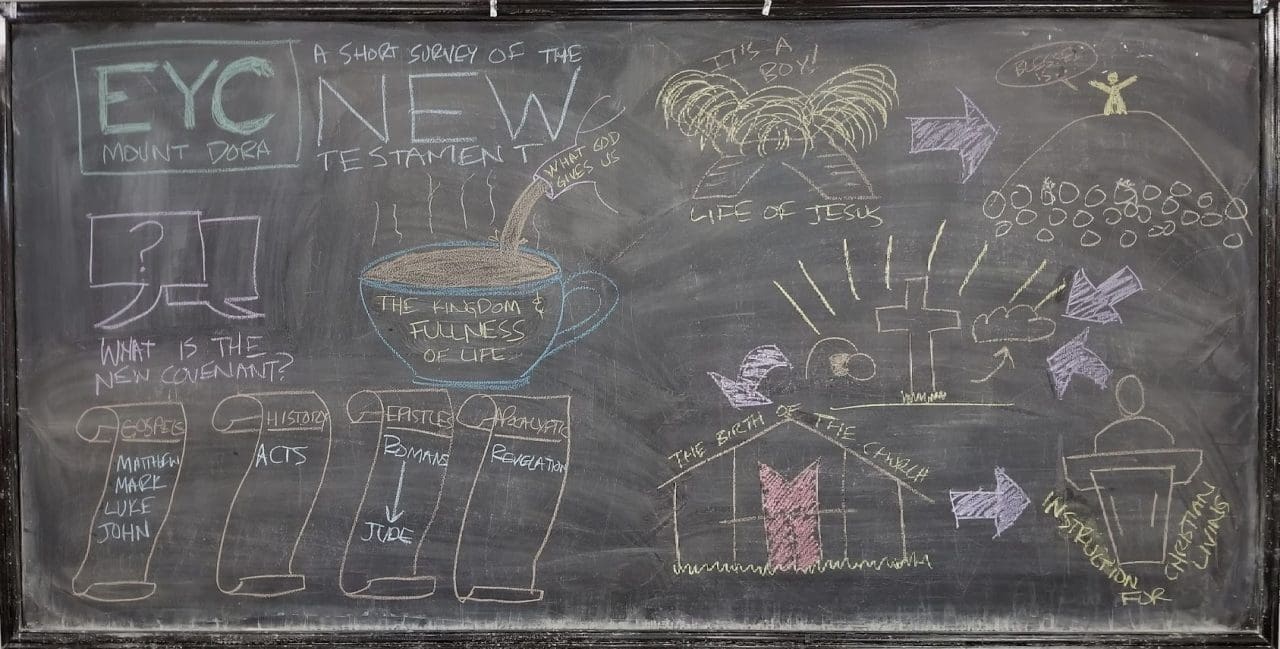

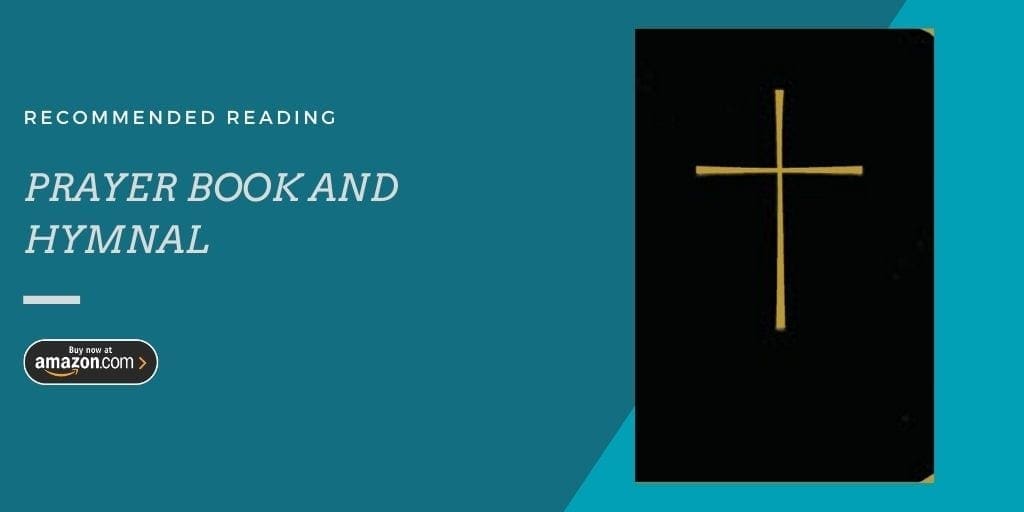



Nice!